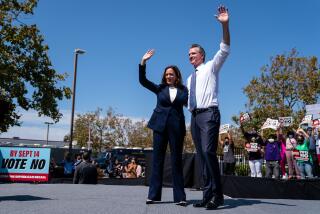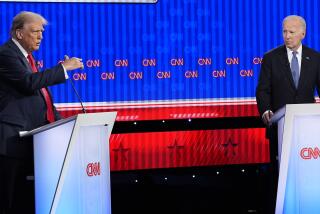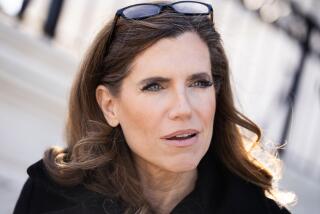NEWS ANALYSIS : CALIFORNIA ELECTIONS / GOVERNOR : Disclosure of Rape Could Be a Key Moment : Impact of Brown’s revelation about her daughter remains uncertain, analysts say. Candidate’s campaign provides an account that seems at odds with what was said during the debate.
- Share via
Whether or not Kathleen Brown overcomes the odds to beat Gov. Pete Wilson next month, her revelation on statewide television that one of her daughters had been raped may go down as one of the defining moments in the Wilson-Brown contest.
In the days since the debate, the disclosure--which occurred midway through last Friday’s debate and which Brown has since refused to discuss in detail--has been repeatedly broadcast on television as political analysts have weighed both its motives and its impact.
Was the disclosure spontaneous or calculated? Did it help Brown connect with the women voters whose enthusiasm she needs to fuel? Or did it exploit Brown’s daughter’s personal tragedy, distracting attention from more relevant issues? And what of Wilson, who seemed to dismiss the emotional moment as theater?
On Monday, fresh questions were raised when the Brown campaign provided an account that seemed at odds with what the candidate said during the debate. Both campaigns claimed that they had benefited from Friday’s faceoff.
If nothing else, Brown’s decision to reveal the attack on her daughter suggested that she truly wants to be governor--not a small thing, analysts said, for a woman whose reasons for seeking the office have at times seemed little more than familial. But it also seemed to show that she might do anything to win--even expose her the private pain of her 25-year-old daughter, Sascha Rice.
The exchange occurred halfway through the hour-long debate. Brown turned to the Republican incumbent known for his sympathy for crime victims and, in a fierce voice, told him not to question her commitment on crime.
“You cannot imagine what it’s like to be a mother waiting at home late at night for your kids to come home, waiting for your daughter to come home in the evening and having her come home and comfort her, because she’s been raped,” Brown said.
“Or your son called to come home from school while I’m working to say, ‘Come home, because I’ve been robbed’ . . . You can’t understand that. So don’t question my commitment to be tough on crime.”
Wilson, caught off guard, appeared unsympathetic, deriding Brown’s comments as “a moving performance.” At a subsequent news conference, Brown said the incident, a date rape, had occurred years before. She said there were no police reports made and no arrests. She said her son Zeb was mugged in the late 1980s in New York City. None of Brown’s three children could be reached for comment.
The Brown campaign, which since Friday has maintained that the disclosure was not planned, Monday provided new details about the events that led up to it. Steve Glazer, a spokesman for the Brown campaign, said that before the debate Brown had talked to Sascha Rice on three separate occasions about the possibility of making her private life public.
Before Brown declared her candidacy, she discussed with her whole family “how in a high-profile race such as this one, your life can become an open book,” Glazer said. Then, last summer, Brown had “a personal discussion with Sascha where they discussed the rape. It was in the context of ‘this is one of a number of things that people may ask me about and I might talk about.’ ” Glazer said Rice “indicated that she understood that it might come out and that she was accepting of that.”
Then, just a few days before the debate, mother and daughter had a third conversation, Glazer said. “They again discussed this event and . . . that (Brown) might want to talk about it some time in the course of the campaign,” he said. Again, Glazer said, Rice said she was comfortable with Brown making the incident public.
This chronology, however, seems to belie the campaign’s claim that Brown’s remarks were spontaneous. Immediately after the debate, Clint Reilly, Brown’s campaign chairman, said the rape “was not something I even knew about.” He said that “unequivocally. . . this was not something that was prepared.”
Analysts who watched the debate don’t believe it.
“Clearly it just didn’t pop into her head in the middle of the debate. Whether or not it was plotted for months by her consultants, that didn’t come out of nowhere,” said Darry Sragow, who managed Insurance Commissioner John Garamendi’s unsuccessful campaign for governor. “When you’re in the situation she’s in, you have to throw a long pass. She threw a long pass. And every once in a while you throw the long pass and you get a touchdown.”
Larry Sabato, a political science professor at the University of Virginia, agreed and lamented that politics has been reduced to the level of television talk shows.
“Anyone with a grain of sense could see that was a practiced ploy that didn’t spring from her mind in a moment of angst. That was something her consultants dreamed up,” he said, “Of course it says nothing. But TV talk shows have taught us not to be concerned about facts. . . . One doesn’t recite statistics on Oprah or Phil. You recount tear-jerking emotional incidents that are incredibly private.”
Brown’s campaign, Sabato speculated, “was hoping to make an emotional connection with voters and particularly women where she’s been falling.”
Wilson, meanwhile, was technically correct in calling Brown’s outburst a performance, Sabato said. “But he did exactly the wrong thing in appearing to be callous and cruel. The smart thing to do would be (to say), ‘OK, it’s a ploy, but I’m going to match her and raise her and express sympathy.’ ”
The Brown campaign’s account Monday of when Brown learned about her daughter’s rape appeared to contradict Brown. In the debate, Brown made it sound as if she learned of the incident while comforting her daughter on the night that it happened. But according to John Whitehurst, Brown’s press secretary, Brown’s daughter was raped while she was a teen-ager and did not tell her mother until several years later.
Whitehurst said that during the debate, Brown was “drawing from the strength and the passion of her experiences” but was not literally describing her own experience. When asked about the incident at the news conference afterward, however, “she clarified that the experience was indeed her experience as a mother and as a woman.”
He added that Brown wanted “to communicate that her feeling on these issues comes from a very personal source.” He rejected the suggestion that Brown had overdramatized the incident, saying, “She tried to de-escalate it and simplify it, drawing on the most relevant feelings about the moment.”
Joe Cerrell, a Los Angeles political consultant, said the rape disclosure could reverberate throughout the campaign’s final three weeks.
“You know, those sound bites that just stay with you: (Ronald) Reagan turning to (Jimmy) Carter, ‘There he goes again.’ Lloyd Bentsen giving (Dan Quayle) the John Kennedy shot. The (Gerald) Ford faux pas about Poland,” Cerrell said, noting that these kinds of moments take on a life of their own. He predicted that Brown’s rebuff of Wilson over crime “is what you’ll remember from this campaign.”
Another parallel is a presidential debate in 1988 when Democrat Michael Dukakis, an opponent of the death penalty, was asked how he would react if his wife were raped. His response was so unemotional and academic that it was said to have contributed to his defeat by George Bush.
Sherry Bebitch Jeffe of the Claremont Graduate School said that in the Wilson-Brown debate, Wilson got caught in the Dukakis trap, reacting without emotion to an issue about which he professes to care deeply. But despite this, she said, Brown hurt herself by appearing too contrived.
“The timing of it, the choreography of it, the electoral arithmetic of it all led to the perception that it was a calculated performance targeted to women voters and to catch (Wilson) off guard,” Jeffe said. “If indeed it was done to clarify her stance on crime, why wasn’t it done earlier when it would not have looked so cynical?”
“I’m not sure what it reveals about Kathleen Brown--and that’s been her problem all along,” Jeffe continued. “Her explanation does not appear to be resonating because she looked so programmed. . . . It may in the end hurt her, because it took the focus off the charges that she made against Pete Wilson. She has become the issue yet again.”
More to Read
Get the L.A. Times Politics newsletter
Deeply reported insights into legislation, politics and policy from Sacramento, Washington and beyond. In your inbox twice per week.
You may occasionally receive promotional content from the Los Angeles Times.









